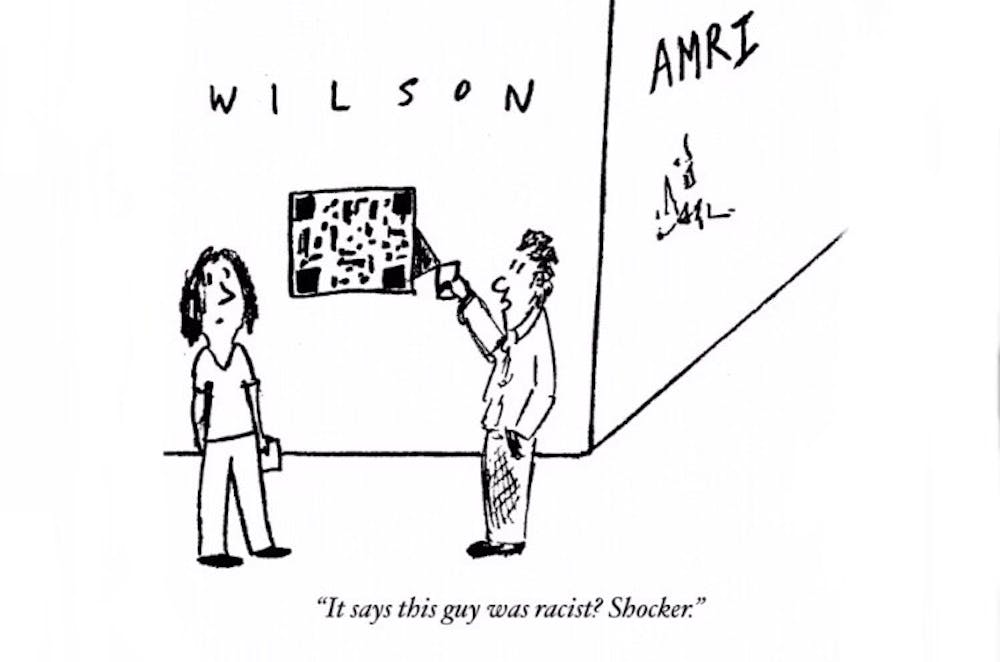Last July, the University launched several initiatives following the nationwide protests that took place after the deaths of George Floyd, Tony McDade, Breonna Taylor, Ahmaud Arbery and countless others. To address the University’s own role in structural racism, Hopkins created the Committee to Establish Principles on Naming, given the lives and legacies of many of our buildings’ namesakes.
The committee has held six hearings to set standards for renaming and de-naming titles of Hopkins buildings, scholarships and programs that may be associated with racism or inequality. (We note that in December, University President Ronald J. Daniels ruled out discussions on renaming Hopkins despite revelations that our founder and namesake owned enslaved people.)
However, we believe that this process is happening far too slowly. In November 2016, Associate Professor of History Nathan Connolly and the Homewood Faculty Assembly called on the University to rename the Woodrow Wilson Fellowship due to the former president’s well-known racist legacy. Likewise, last July, the Student Government Association voted unanimously to change the name of the fellowship, as well as Gildersleeve House of AMR II.
Yet the name of the Woodrow Wilson Fellowship remains unchanged.
Now, years after motions to rename the fellowship, the University hasn’t formed a committee tasked with actually renaming buildings and scholarships, but has instead formed one tasked with establishing guidelines for that process. Drawing out the process further, the committee has said it will have a final draft no sooner than the end of this semester — nearly a year after the committee was created.
Forming guidelines in and of itself can only do so much. We commend the University’s intention to ensure the renaming process remains fair in its deliberation; however, the judging of each candidate has to be on a qualitative, case-by-case basis by nature. How can there be a set standard for judging whether a person was prejudiced enough to have their name removed from a building or scholarship?
So far, one of the more tangible ideas from this committee is placing QR codes around campus to provide students with information about buildings’ namesakes. While we are certainly in favor of the educational aspect of this idea, we wonder whether it would be better to simply and quickly rename the buildings that memorialize racists.
We appreciate that the roster includes Connolly and other notable Black faculty members. However, only one undergraduate student of color is on the committee; there should be more students involved in the process, instead of four trustees. The University should not prioritize its financial interests over the insights of those who are directly impacted by racist namesakes on their campus.
There is ample precedent set by universities in confronting racist histories. Yale University established its own committee in 2016 and renamed Calhoun College months later. Within a single semester, Duke University renamed its Carr building (though not with its own challenges). Princeton University renamed both its Woodrow Wilson school and college in June 2020.
We are glad that Hopkins has been in contact with peer institutions about this issue. Yet in deliberating whether to rename the Woodrow Wilson Fellowship and buildings on campus, Hopkins is lagging behind them. Hopkins must formally start the renaming process.
These slow committee deliberations remind us of our coverage of the 2020 Task Force to review the 2016 Roadmap on Diversity and Inclusion. In an interview with The News-Letter, Edidiong Ekpo, a member of Female Leaders of Color and the Black Student Union, called on students to hold the University accountable for taking urgent and meaningful action.
“Unless we hold their feet to the fire,” she said, “any real change is going to be lost in committees, or meetings or town halls or surveys.”

















